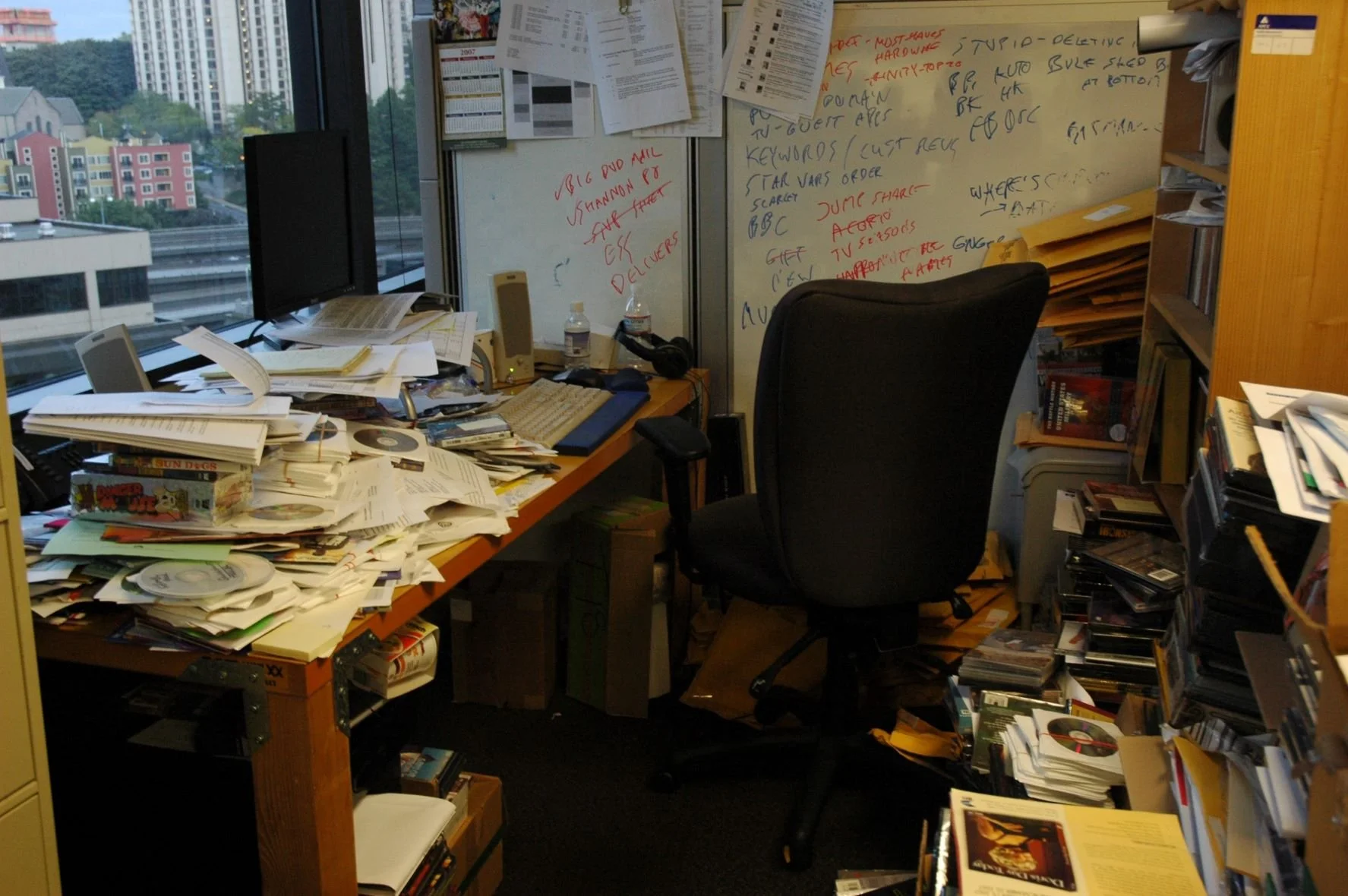First, Find Your Writing Space
The primary requirement in any big writing project is to decide where you will write it. Ideally, your setting is one that allows your ever-accumulating notes and books to spread out in whatever organizational scheme makes you, the writer, comfortable. The photo attached to this blog isn’t my office, but it could be. It’s close enough to how my desk looks by the time the first draft reaches its end.
For this reason alone, a writer’s best friend is a door. Lacking a door, as many of us do, the next best thing is a reliably empty, quiet space—somewhere like the moon. Finding such a place is a challenge. The further it is from your home the more readily you can devise excuses for not going.
I’m deeply aware of my good fortune in having a studio/office space to myself. Such luck required waiting for both daughters to grow up and move out. The greatest advantage in my office door is that it prevents my creative mess from creeping through the house like some fungal alien invader. The downside of my door is whenever any thing’s proper place escapes recall, my family figures that thing belongs in my writing space. They then shut the door, believing their stowed-away items disappear.
The photo attached to this blog isn’t my office, but it could be. It’s close enough to how my desk looks by the time the first draft reaches its end.
Due to the tonnage of junk amassed, before starting a new project, I clean my office—re-shelving books, filing/recycling papers, and taking the vacuum cleaner back to the basement where it belongs. I might even dust. The point is not only to remove the previous project from my sight. The point is also to let the previous project submerge among my past writing. To start a new story on a blank page, I need a blank space where the new can unfold.
Virginia Woolf’s dictum that to write, one must have a room of one’s own, is more subversive than it may read on the surface. Woolf is saying that writers have to be willing to take up space in service of work that others may see as nonsensical. To make such a room, you are going to have to claim what is often prime real estate as your work space. You’re going to have to demand not to be disturbed (if you have young children, they’ll take that as a dare). You’re going to have to mean it and put up a stalwart defense when everyone complains. And everyone will complain. Office or not, every writer needs to be their own lockable door.
Simply put, you have to take yourself and your writing seriously. Any writer can come up with thousands of reasons to not write. They write anyway. You must believe you and your words are worth the space you’re taking—not asking for—taking. No way is that easy to do, especially if you, like me, tend to apologize to coffee tables when you ram your shin into one. The only way to get writing done is to write, but you can find your space without a revolution. It takes only a few realistic, achievable baby steps.
Want to write at your dining room table (provided dining rooms still exist)? Take a journal, sit down at the table in a quiet minute, set a timer, and write something. Do that regularly, increasing the time, until you feel comfortable sitting in that space and writing while telling others to leave you alone.
Many writers get up god-awfully early or go to bed god-awfully late to fit in their writing time. If that feels workable to you, try it. Personally, considering the insanely busy lives we lead, giving up sleep may not be the wisest choice. You want a time frame for writing you know is manageable without impacting your health or risking burn out. Trade-offs will be needed. It’s difficult but can be done—must be done—if you’re going to write your project, a process that can take weeks, months, years.
To prepare your space is to prepare yourself. If you have trouble owning your needs as a writer, you will have the same kind of trouble owning your words, your truth, in your writing. Both are a means of declaring you exist. The true perfect room of your own is located within your commitment to your writing.
An old saw has it that fortune favors the brave. Sometimes the bravest thing you can do in writing is to declare you’ll write exactly where you are and then do it. Everybody else can damn well adapt.
Writing Exercise
Write about your ideal studio or office. What makes that space ideal for you? From reading what you have written, make a list of the elements that you can recreate where you are. (Example: Silence? Headphones and an infinitely streaming white noise recording; spectacular views? Posters). In this exercise, try to embody the belief that your writing work has the same—if not greater—value as any of your other work. Find the space in your environment that feels welcoming and spacious to your writer-self. Write a description of that space. If anyone gives you grief about taking it, show or read them your words on why. Be realistic. Be kind. Be resolved.
Photo by Wonderlane on Unsplash

